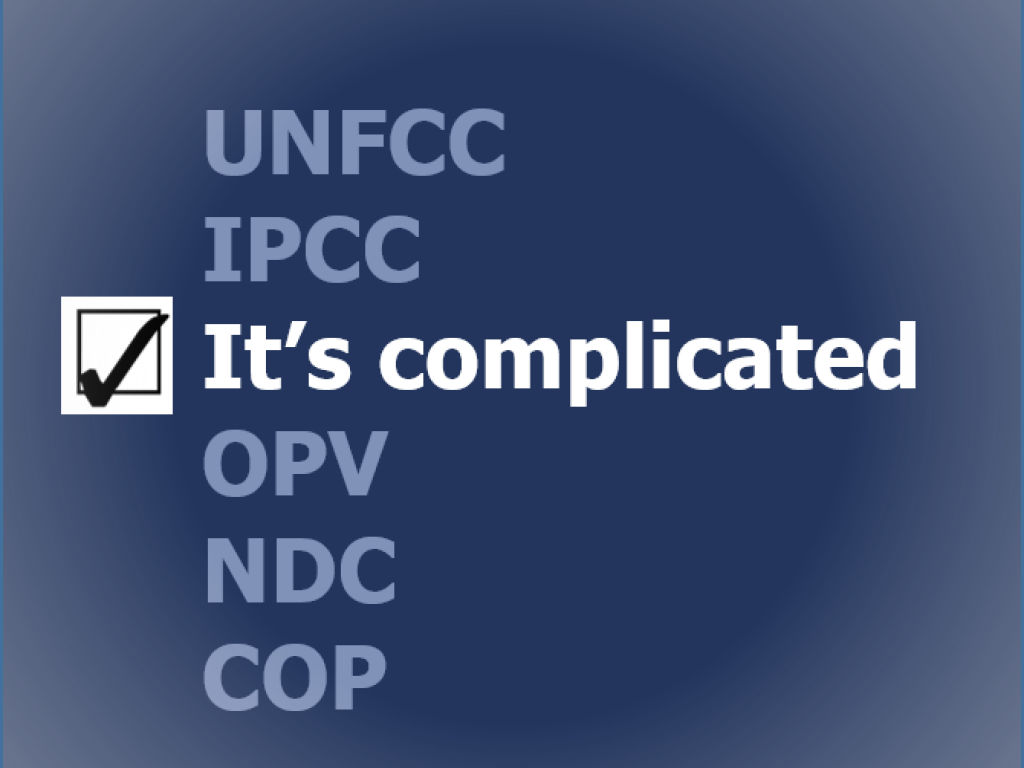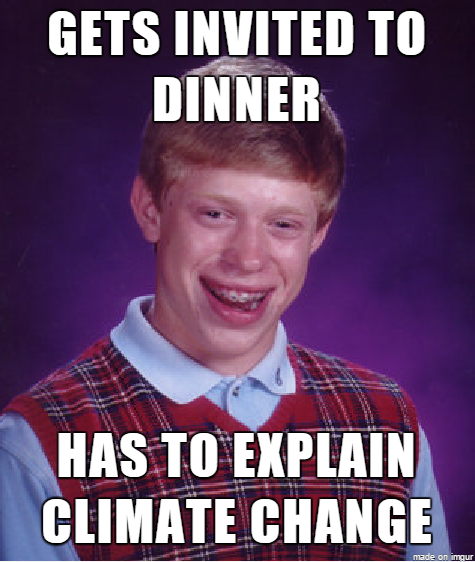Communication of climate change – learning the hard way

By Roland Hunter
Many a time, the climate change researcher has sat around a dinner table with friends or family and conversation has settled on the topic of mankind’s future under climate change. Sensing the direction of the conversation, he curses quietly to himself as he realises that his soup may turn cold before he tastes it – uh-oh, his companions are about to ask him a complex question while hoping for a simple answer. Why does this keep happening to him?
He scans the room for a distraction or an escape from the conversation – a restroom, a fire alarm, an open window, anything to avoid the short answer to the long question – but it’s too late. No sooner than a steaming bowl of soup arrives, his spoon is poised in mid-air and right on cue the brother-in-law asks “so hey man, really, what are these okes doing about the climate thing?”.
“What a pity”, he thinks to himself, “this soup smells delicious”. With a deep and weary sigh, he clears his throat and pushes his bowl aside. “OK, let’s start with the UNFCCC”...

Preaching to the choir vs. Whistling in the wind
As is probably the case in every specialised or technical sector, there is a unique language that is spoken in the hallways of the many organisations related to climate change. It’s hardly surprising that a field which sprawls across themes as diverse as the earth sciences, social development, human health, economics, geopolitics etc. should acquire its own lingo of acronyms and jargon. It probably all started harmlessly enough with the ‘United Nations Framework Convention on Climate Change’ – a bit of a mouthful to say out loud and best contracted to ‘UNFCCC’ (pronounced “Yoo-En-Eff-Trippil-See”). However, the vernacular quickly got out of hand after the first Conferences of the Parties (COP) in 1995 and the adoption of the Kyoto Protocol in 1997, after which the number of acronyms to memorise shot upwards like an Al Gore hockeystick. Fast-forward to the present, and a casual teatime conversation between colleagues “reviewing the I-N-D-Cs of all L-D-Cs submitted before the last C O P of the U-N-Eff-Trippil-See” sounds as much like a hiphop rhyme-battle as a research topic. (For a dry explanation of climate change terminology, see the Scientific American’s introduction to our world of “climate diplomacy gobbledygook” here.
On the upside, this style of conversational shorthand is a testament to the adaptability of human language and how quickly we are able to expand our vocabularies or adopt new meanings for specific words and phrases in order to make ourselves understood. Incredibly, there is a global community of climate negotiators, researchers and project developers that are able to communicate with each other using this Frankenstein’s language of technical acronyms and diplomatic euphemisms – they know their NAMAs from their NAPAs, their NDCs from their INCs. Arguably, international climate change negotiations have progressed because of, rather than in spite of, the slow and deliberate definition of a common language.
On the other hand, one might also argue that this tendency towards institutional jargon is typical of the challenge of communicating information on climate change, or any complex but socially important topic, to a wider audience. Consider the UK’s ‘Brexit’ referendum, when Michael Gove said that Britain’s voters have “had enough of experts” - and turned out to be more or less (~52%?) correct! Perhaps the public could have been persuaded to ‘Remain’ if those same experts had found an interesting way of talking about things like “tariffs” and “inward investment” and made some of their graphs a bit less, well, boring? The point is that when we are working with complex information and some very dull acronyms, it’s easy to lose sight of the important ‘take-home points’ that could be communicated later to a wider audience. Who else needs to know about this? How do we make it relevant to them? How do we avoid becoming the boring expert? Economists are not great at answering these questions – mainly, they are good at economics. How many other fields suffer from the same lopsided skillsets?
Know your stakeholder
When I began my career as a young(er) consultant, it took me some time to get to grips with the concept of a ‘stakeholder’. They came in all shapes and sizes, seemingly – public and private, local and national – and all the literature insisted that it was very important that these stakeholders be consulted and engaged. However, when I went back through my old undergraduate course notes, I was surprised to find no mention of ‘stakeholders’ anywhere – just pages of statistics and chemistry and plant physiology – and I started to wonder if our (or at least, my) education helped or hindered my ability to communicate outside of my own discipline.
As it turned out, at least as far as the first few years of my career were concerned, ‘stakeholders’ could mean anything from farmers and shepherds to environment ministers and mayors, from professors to fishermen, from game wardens to poachers. I learned the hard way not to expect that a stakeholder would speak my language, never mind my jargon. Some ten years and many hard lessons past my undergraduate days, it only takes a casual question around the dinner table to remind me of these gaps in my own skillset. While I’ve gotten to grips with my own group of stakeholders – if I have to, I’ll talk OPVs with the farmer and NDCs with the minister – every time I take a step outside of familiar circles I am reminded that improving my ability to communicate outwards must be a lifelong habit.
Back to the dinner table: soup has gone cold, eyes are glazing over, and the researcher is scribbling explanatory diagrams on a napkin. He is having a minor crisis of self-confidence – If he can’t explain himself simply in plain language, does he even understand the subject well enough?
Scientific communication 101: end it all with a quote
“If you can’t explain it simply, you don’t understand it” is a quote frequently (and incorrectly) attributed to Albert Einstein. Although the simplicity of the motto is appealing, perhaps there are instances when we should not hold ourselves to quite such a high standard, and most particularly when it comes to the inherent uncertainty and complexity of climate change. We should be hesitant to oversimplify a complex topic if there is a chance that misunderstandings can have a negative impact. To offer a contrasting quote, Richard Feynmann supposedly said of his own findings that “if I could explain it to the average person, it wouldn’t have been worth the Nobel prize”. My aspiration is to land somewhere between these two extremes – as far as possible, I feel a new obligation to try to play it like ‘Einstein’ and communicate with utmost efficiency, clarity and minimal jargon. If I can’t put it across by the time my soup cools, I’m switching back to Feynmann and I’ll try again another night.
Disclaimer: The views expressed here are solely those of the author in her private capacity